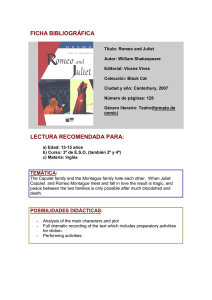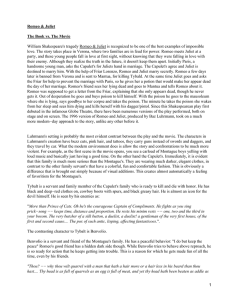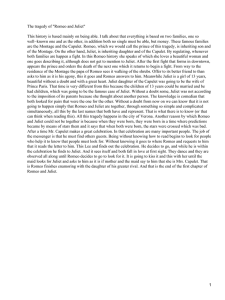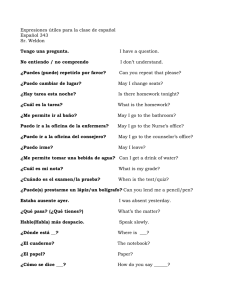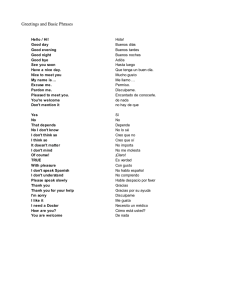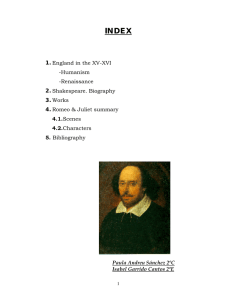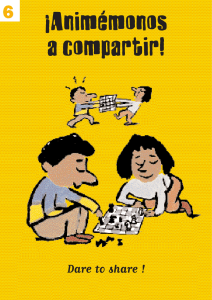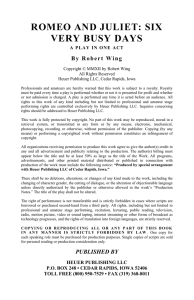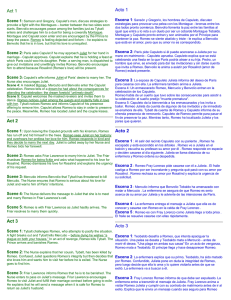Romeo and Juliet - Teacher`s Pet Publications
Anuncio
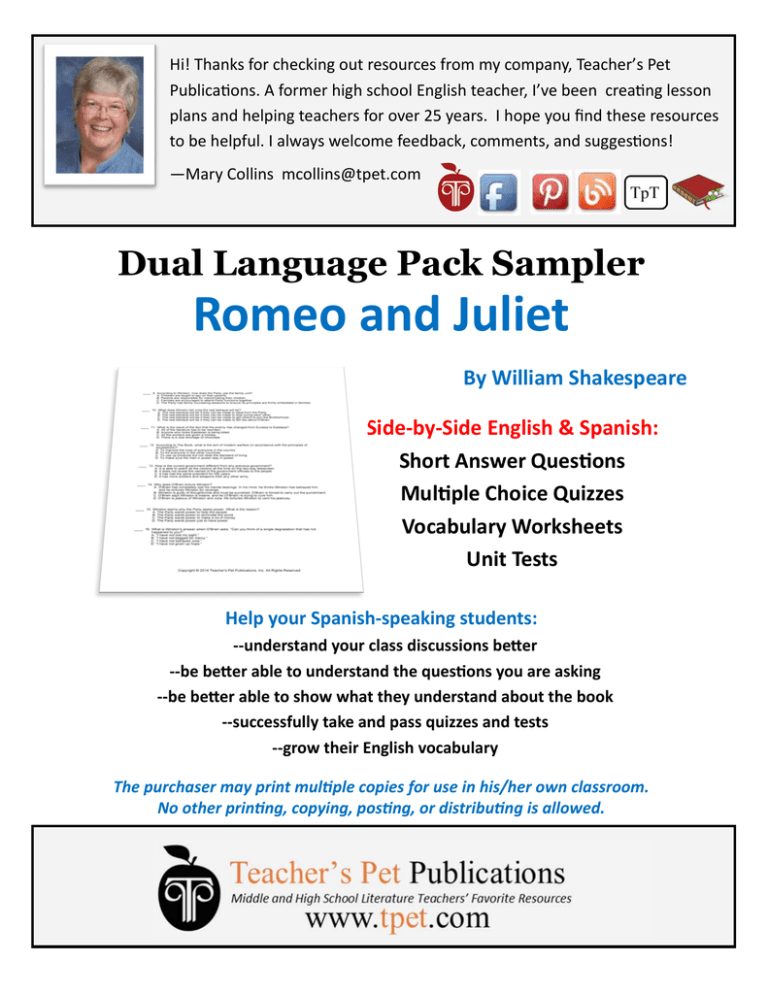
Hi! Thanks for checking out resources from my company, Teacher’s Pet PublicaƟons. A former high school English teacher, I’ve been creaƟng lesson plans and helping teachers for over 25 years. I hope you find these resources to be helpful. I always welcome feedback, comments, and suggesƟons! —Mary Collins mcollins@tpet.com Dual Language Pack Sampler Romeo and Juliet By William Shakespeare Side‐by‐Side English & Spanish: Short Answer Ques ons Mul ple Choice Quizzes Vocabulary Worksheets Unit Tests Help your Spanish‐speaking students: ‐‐understand your class discussions be er ‐‐be be er able to understand the ques ons you are asking ‐‐be be er able to show what they understand about the book ‐‐successfully take and pass quizzes and tests ‐‐grow their English vocabulary The purchaser may print mulƟple copies for use in his/her own classroom. No other prinƟng, copying, posƟng, or distribuƟng is allowed. TEACHER'S PET PUBLICATIONS Dual Language Pack for ROMEO AND JULIET based on the book by William Shakespeare ISBN 978-1-60249-231-9 Copyright 2015 Teacher’s Pet Publications 2 Copyright 2015 Copyright Teacher's Pet Publications 2015 Only the student materials in this packet may be reproduced multiple times for use in the purchaser's classroom. Do Not Post Any Of These Materials To The Internet. For any additional copyright questions, contact Teacher's Pet Publications. www.tpet.com 3 Copyright 2015 TABLE OF CONTENTS Dual Language Pack Romeo and Juliet 5 Short Answer Study Questions 10 Multiple Choice Quiz Questions 21 Discussion Questions 26 Vocabulary Word List Vocabulary Worksheets 28 Assignment 1 Act I 30 Assignment 2 Act II 32 Assignment 3 Act III 34 Assignment 4 Acts IV & V 37 All Assignments Matching 1 39 All Assignments Matching 2 41 All Assignments Juggle Letters 1 43 All Assignments Juggle Letters 2 Unit Tests 46 Short Answer Unit Test 1 53 Short Answer Unit Test 2 61 Advanced Short Answer Test 67 Multiple Choice Test 1 79 Multiple Choice Test 2 4 Copyright 2015 STUDY GUIDE QUESTIONS Romeo and Juliet Assignment 1 Act I 1. Why do Sampson and Gregory fight with Montague's men? (¿Por qué Sampson y Gregory luchan con los hombres de Montague?) 2. Benvolio and Tybalt come upon the servants fighting. Contrast their reactions to the fight. (Benvolio y Tybalt se topan con unos criados peleando. ¿Cómo reaccionan a la pelea?) 3. When Montague and Capulet enter and see the disturbance, they want to fight, too. What do their wives say? (Cuando Montague y Capulet entran y ven el alboroto, quieren pelear también. ¿Qué dicen sus esposas?) 4. What ended the opening skirmish? (¿Qué acabó la escaramuza inicial?) 5. Why is Romeo so sad? (¿Por qué está tan triste Romeo?) 6. In Act I Scene ii, Paris asks Capulet for Juliet's hand in marriage. What is Capulet's reply? (En el Acto I Escena ii, Paris pide a Capulet la mano de Julieta. ¿Cuál es la respuesta de Capulet?) 7. Why is Capulet giving a feast? (¿Por qué Capulet da un banquete?) 5 Copyright 2015 MULTIPLE CHOICE STUDY/QUIZ QUESTIONS Romeo and Juliet Assignment 1 Act I 1. Why do Sampson and Gregory fight with Montague's men? (¿Por qué Sampson y Gary pelean con los hombres de Montague?) A. Montague's men pushed Sampson against the wall. (Los hombres de Montague empujaron a Sampson contra la pared.) B. Montague's men wouldn't let them pass. (Los hombres de Montague no les permiten pasar.) C. They are drunk and looking for a fight. Montague's men just happen to get mixed up with them at the wrong time. (Están borrachos y buscan una pelea. Los hombres de Montague se encuentran con los otros en mal momento.) D. They are fighting for their master, who is a Capulet. (Están peleando por su amo, quien es un Capulet.) 2. Benvolio and Tybalt come upon the servants fighting. How do they react to the fight? (Benvolio y Tybalt se topan con unos criados peleando. ¿Cómo reaccionan a la pelea?) A. Benvolio tries to break it up, but Tybalt wants to fight. (Benvolio trata de acabarla pero Tybalt quiere participar.) B. They both encourage all the servants to fight. (Los dos animan a todos los criados a pelear.) C. Benvolio wants to fight, but Tybalt runs away. (Benvolio quiere pelear pero Tybalt huye.) D. They both ignore it. (Los dos lo ignoran.) 3. When Montague and Capulet enter and see the disturbance, they want to fight, too. What do their wives say? (Cuando Montague y Capulet entran y ven el alboroto, quieren pelear también. ¿Qué dicen sus esposas?) A. The wives think the servants should do the fighting. (Las esposas opinan que los criados deben pelear.) B. The wives say they will join in the fight and help the men. (Las esposas dicen que pelearán también para ayudar los hombres.) C. The wives think the old men should stop fighting. (Las esposas opinan que los hombres viejos deben dejar de pelear.) D. The wives offer cheers and support. (Las esposas ofrecen aclamaciones y apoyo.) 10 Copyright 2015 Romeo and Juliet Discussion Questions Page 2 Critical 4. Define "tragedy" in the theatrical-literary sense of the word. Explain why Romeo and Juliet is a tragedy. (Defina "tragedia"en el sentido teátrico/literario de la palabra. Explique por qué Romeo y Julieta es una tragedia.) 5. Explain how William Shakespeare uses Friar Laurence in the play. (Explique cómo William Shakespeare usa a Fray Laurence en la obra.) 6. What things in Romeo and Juliet are due to fate, and what effect does that have on our perception of the play? (Cuáles eventos en Romeo y Julieta son causados por el destino y qué efecto tienen estos eventos en nuestra percepción de la obra?) 7. Explain in detail the significance of the last lines of the play explaining all the possible ways it is true: "For never was a story of more woe Than this of Juliet and her Romeo." (Explique detalladamente el significado de las últimas líneas de la obra explicando todas las posibles maneras en que es verdad: “Nunca hubo una historia de más tragedia que esta de Julieta y su Romeo.”) 22 Copyright 2015 Romeo and Juliet Vocabulary Worksheet Assignment 1 Continued 13. Then dreams he of another benefice/Sometime she driveth o'er a soldier's neck... 14. Thus from my lips by thine my sin is purged. 15. Too early seen unknown, and known too late!/That I must love a loathed enemy. _______________________________________________________________________ Part II: Determining the Meaning -- Match the vocabulary words to their dictionary definitions. 1. PROFANERS A. Future generations (Generaciones futuras) 2. PERNICIOUS B. Regard with respect (Tener respeto por alguien) 3. AUGMENTING C. Be or become weak or feeble (Ser o hacerse débil o achacoso) 4. PORTENTOUS D. A person who holds opinions contrary to the beliefs of others in a group (Una persona con creencias contrarias a las del grupo, primariamente usado en un contexto religioso) 5. TRANSGRESSION E. Foreboding (Presentimiento) 6. POSTERITY F. Indistinctly heard; faint (Oído indistintamente; apenas perceptible) 7. LANGUISH G. Making something already developed greater (Mejorar algo ya desarrolado) 8. HERETICS H. Free from impurities (Sin impurezas) 9. ESTEEM I. A church office endowed with fixed capital assets (Una oficina de la iglesia con patrimonio financiero fijo) 10. OBSCURED J. A member of a municipal legislative body (Un miembro de un grupo legislativo municipal) 11. BOISTEROUS K. Those who have irreverence for that which is sacred (Los que tienen irreverencia por lo sagrado) 12. ALDERMAN L. Evil; wicked (Malo; bellaco) 13. BENEFICE M. Rough and stormy; noisy and excited (Escabroso y tormentoso; ruidoso y excitado) 14. PURGED N. Disliked (Detestar) 15. LOATHED O. Violation of a law (Violación de una ley) 29 Copyright 2015 SHORT ANSWER UNIT TEST 1 Romeo and Juliet ,0DWFKLQJ 3$5,6 /$'< $ +HJLYHVDIHDVWWRLQWURGXFH-XOLHWWREDFKHORUV'DXQEDQTXHWHSDUD SUHVHQWDUD-XOLHWDDORVVROWHURV % %RWK3DULV5RPHRZDQWWRPDUU\KHU$PERV3DULV\5RPHR TXLHUHQFDVUVHFRQHOOD & 6HUYDQWWR5RPHR6LUYLHQWHGH5RPHR 0217$*8( ' 6KHUHIXVHG5RPHR VORYH5HFKD]yHODPRUGH5RPHR 35,1&( ( +HDJUHHVWRPDUU\5RPHR-XOLHW)ULDUBBBeODFFHGHDFDVDUD 5RHPR\-XOLHWD)UD\BBB ) 6KHZDQWVWKH3ULQFHWRH[HFXWH5RPHRBBB&DSXOHW(OODTXLHUHTXHHO 3UtQFLSHHMHFXWHD5RPHRBBBBB&DSXOHW * 5RPHR VFRXVLQ3ULPRGH5RPHR %(192/,2 &$38/(7 %$/7+$6$5 1856( + 5RPHRNLOOVKLPWRDYHQJHKLVIULHQG VGHDWK5RPHRORPDWDSDUD YHQJDUODPXHUWHGHVXDPLJR -8/,(7 , +HNLOOVKLPVHOIZKHQKHWKLQNV-XOLHWLVGHDG6HPDWDFXDQGRSLHQVD TXH-XOLHWDHVWiPXHUWD 6+$.(63($5( - $XWKRURI5RPHRDQG-XOLHW(ODXWRUGH5RPHR\-XOLHWD 520(2 . +HLVVODLQE\7\EDOW(VPDWDGRSRU7\EDOW /$85(1&( / +HVHQGV5RPHRLQWRH[LOH0DQGDD5RPHRDH[LOLR 0(5&87,2 0 5RPHR VIDWKHU(OSDGUHGH5RPHR 7<%$/7 1 -XOLHW VIDLWKIXOFRQILGDQW/DILHOFRQILGHQWDGH-XOLHWD 526$/,1( 2 &DSXOHWZDQWV-XOLHWWRPDUU\KLP&DSXOHWTXLHUHTXH-XOLHWDVHFDVH FRQpO 46 Copyright 2015 Romeo and Juliet Short Answer Unit Test 1 Page 2 II. Short Answer 1. Why do Sampson and Gregory fight with Montague's men? (¿Por qué Sampson y Gregory luchan con los hombres de Montague?) 2. Why is Romeo so sad? (¿Por qué está tan triste Romeo?) 3. Why is Capulet giving a feast? (¿Por qué Capulet da un banquete?) 4. Why does Friar Laurence agree to marry Romeo and Juliet? (¿Por qué Fray Laurence accede a casar a Romeo y Julieta?) 5. How do Mercutio and Tybalt die? (¿Cómo mueren Mercutio y Tybalt?) 6. Why did Romeo's killing Tybalt put Juliet in a bad position? What did she finally decide? (¿Por qué está Julieta en una mala posición cuando Romeo mata a Tybalt? ¿Qué decide ella al final?) 7. What advice does Nurse give to Juliet? (¿Qué consejo le da la enfermera a Julieta?) 47 Copyright 2015
